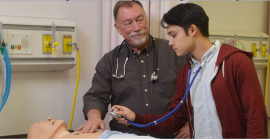- About
- History
- Philosophy, Mission & Goals
- Message from the Dean
- Rankings
- Enrollment Profile
- Accreditation
- Faculty, Research & Funding
- Diversity, Equity, Inclusion and Community Partnerships
- Sustainability
- Academic Departments
- Administrative Departments
- International Partnerships
- Health Science IT
- Visitor Information
- Admissions
- Upcoming Application Deadlines
- High School Requirements
- Bachelor of Science in Nursing
- Internal Transfer Applicants
- External Transfer Applicants
- Accelerated 2nd Degree BSN
- Master of Science in Nursing
- Doctor of Nursing Practice
- Dual DNP/PhD Program
- PhD in Nursing
- International Applicants
- Non-Degree Student Information
- Programs
- BSN Program
- BSN Honors
- Accelerated 2nd Degree BSN
- Master of Science in Nursing
- Doctor of Nursing Practice (DNP)
- Dual DNP/PhD Program
- Doctor of Philosophy (PhD)
- Online Graduate Programs
- Certificates
- Adult-Gerontology Acute Care Nurse Practitioner Certificate
- Certificate in Gerontology for Nurse Practitioners
- Health Care Genetics Certificate
- Neonatal Nurse Practitioner (NNP) Certificate
- Nursing Education Certificate
- Nursing Informatics Certificate
- Pediatric Acute Care Nurse Practitioner Certificate
- Psychiatric Mental Health Nurse Practitioner Certificate
- School Nurse Certificate
- Minors
- Courses
- Certification Pass & Retention Rates
- Undergraduate NCLEX Pass Rates
- Adult-Gerontology Acute Care Nurse Practitioner Pass Rates
- Adult-Gerontology Primary Care Nurse Practitioner Pass Rates
- Clinical Nurse Leader Pass Rates
- Clinical Nurse Specialist Pass Rates
- Family Nurse Practitioner Pass Rates
- Nurse Anesthesia Pass Rates
- Neonatal Nurse Practitioner Pass Rates
- Nurse-Midwife Pass Rates
- Primary Care Pediatric Nurse Practitioner Pass Rates
- Psychiatric Mental Health Nurse Practitioner Pass Rates
- Students
- Faculty
- Research
- Institutional Research Training Grants
- Office of Research and Scholarship
- Nursing Research and Scholarship HUBS
- HUB for Excellence in Digital Health Research
- Genomics of Patient Outcomes HUB
- Sleep and Circadian Science Research Hub
- Nursing Health Services and Policy Research HUB
- Cancer Survivorship HUB
- Maternal/Perinatal and Reproductive Health Research Hub
- Aging and Gerontological Nursing Research HUB
- Nursing Education and Clinical Research for EBP HUB
- Active Grants
- Undergraduate Research
- Continuing Ed
- Alumni
- News
- Events
Accelerated 2nd Degree BSN (ABSN)
Nursing is a profession of immense importance, offering many personal and professional rewards. For those considering a career change or going back to school, becoming a nurse is a valuable investment in your future and a way to contribute significantly to the well-being of individuals and communities.
The Accelerated Second-Degree BSN program gives students who have already earned a baccalaureate degree or higher the opportunity to earn their BSN in one year. As the healthcare industry continues to evolve, the need for nurses will only grow, making it an ideal time for individuals to pursue a nursing education and positively impact the world.
A guaranteed total scholarship of $8,333.00, split into three terms (Term 1 - $3000; Term 2 - $2333; and Term 3 - $3000) is available upon your admission and subsequent commitment to begin your studies.
While there are prerequisite courses for this program, Pitt Nursing is open to assessing the courses you have previously completed to determine their suitability as substitutes or collaborate with you to develop a customized plan to meet these requirements. We encourage you to email our academic advisors at absn@pitt.edu who can assist you with your course planning.
About our Accelerated 2nd Degree BSN
Build on what you learned from your previous degree(s) program or career path to become a Registered Nurse. The Accelerated 2nd Degree BSN track is designed for those who have earned a baccalaureate or higher degree in a non-nursing field and are looking for new challenges.

Foundations for Graduate Study
The 2nd Degree program provides a solid foundation for graduate study, which is essential for those who wish to pursue careers in advanced practice positions (such as nurse anesthesia or nurse practitioner), research, and health care management. It is estimated that growth for nurses with graduate degrees will top 50%: many of Pitt’s 2nd Degree students go onto to pursue graduate studies.
Accelerated 2nd Degree BSN Application & Admission
Early submission of an application is recommended. Accelerated 2nd Degree BSN applications are reviewed as per the following deadlines. Applicants should apply online directly to the School of Nursing. The Graduate Record Examination (GRE) is no longer a mandatory component of the application process.
ABSN Program Student Learning Outcomes
View student learning outcomes of the Accelerated 2nd Degree Bachelor of Science in Nursing (ABSN) .
Frequently Asked Questions
Get answers to some of our frequently asked questions about the Accelerated 2nd Degree BSN.
Facts about 2nd Degree Students
The Accelerated 2nd Degree BSN program has attracted students from all over the country.
Curriculum
Additional Information
Professional Licensure Notification
Graduation from our accredited program is your initial step toward obtaining a professional RN license and practicing as a registered nurse. The United States and U.S. territories usually require a professional license to be employed. If you plan on being employed after you graduate, please visit NursingLicensure.org for state specific requirements.





